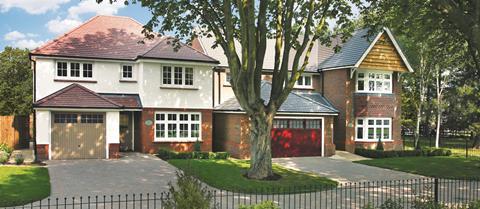Housebuilder said it preferred other ways to cut costs than modern methods of construction as it reported an annual profit of £406m

Redrow has ruled out a significant shift to using modern methods of construction to build its homes, after reporting the sixth consecutive year of record-beating numbers.
The housebuilder said it preferred cutting the time to deliver its schemes by reducing gaps in the amount of time a site wasn’t being worked on.
It said by focusing on eliminating the standing time the overall build time could be reduced.
“Whilst we do use modern methods of construction across the group, such as timber frame and steel frame and individual products, this is more specific to the site and the product we are building.
“We are looking at various smaller areas of efficiency rather than wholesale changes and a move to MMC,” it added.
And the group said the changes to Help to Buy coming into effect in 2021, notably the regional price caps, would hit the ability of first-time buyers to acquire homes through the scheme in the more affluent areas of the north and midlands.
“This goes against the initial intention of the scheme when it was launched in 2013, to make homes more affordable across the country,” it said.
“London will be least affected by the changes in 2021 but, unless the scheme is extended or transitional arrangements are put in place, it will be impacted most in 2023 as a consequence of the growing take-up and the higher equity loan available in the capital,” it added.
Redrow said its “traditional” Heritage homes product (pictured) aimed to offset some of the potential downturn by attracting more buyers from the secondhand market who would not ordinarily consider buying a new home.
“We are particularly cautious about future investment and will continue to de-risk any investment through either private rented schemes or partnership agreements,” it added.
And with a slight hike in the number of the group’s owned and contracted land holdings to 28,566 plots Redrow said it was sticking to a cautious approach to buying land “and will continue to do so until there is more certainty around Brexit and the outlook for the economy”.
Redrow’s comments came as it posted turnover of £2.1bn for the year to the end of June 2019, up 10%, with pre-tax profit up 7% at £406m, the first time it breeched the £400m mark.
Operating profit rose 8% to £411m, resulting in an operating margin of 19.5%.
The firm completed 6,443 homes in the year, passing the 6,000-mark for the first time. The number of affordable homes it built rose 55% to 1,712 units.
The increase in affordable housing accounted for the group’s average selling price falling by 2% to £324,500, while the private average selling price rose by 2% to £389,500, due to the geographic mix of its sales and a small element of house price inflation.










No comments yet